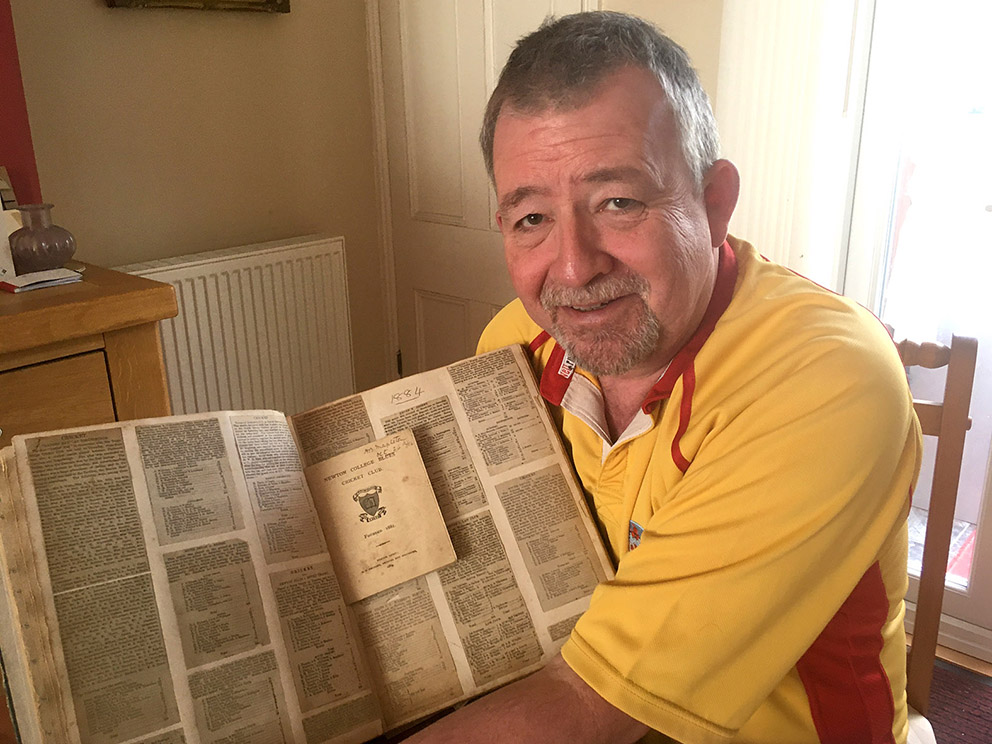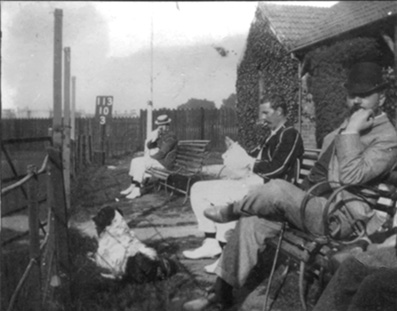
THE chance discovery of a scrapbook opened 140 years ago has brought a slice of Newton Abbot’s sporting and social history back to life.
Cricketer and rugby player Henry Banbury Mapleton was the medical officer of health for Newton Abbot Urban and District councils, and both Dawlish councils as well, from 1900 to 1932.
The scrapbook charts Dr Mapleton’s sporting highs and lows as well as most of the 32 years he devoted to the health and well being of the local populace.
.jpg) From 1918 onwards space in the scrapbook is devoted to Dr Mapleton’s campaign to improve public health, either by prosecuting shopkeepers flouting regulations or his fund-raising events on behalf of the town’s poorest families.
From 1918 onwards space in the scrapbook is devoted to Dr Mapleton’s campaign to improve public health, either by prosecuting shopkeepers flouting regulations or his fund-raising events on behalf of the town’s poorest families.
Journalist and cricket archivist Conrad Sutcliffe stumbled across the scrapbook while researching the history of South Devon CC ahead of the Newton Abbot club’s 175thanniversary.
Sutcliffe wasn’t searching for Henry Mapleton, but another South Devon old boy from a similar generation, John Rayner Hatfield, when he made the discovery.
“J R Hatfield was also a doctor who played for South Devon around the same time and an Internet search brought him up and Dr Mapleton,” said Sutcliffe, who lives a six-hit away from the South Devon ground.
“I clicked on the Mapleton link and it took me to a sporting book dealer in Surrey, who was offering the scrapbook for sale.
“The on-line description of the book included a picture of the young Dr Hatfield ready to go out to bat for South Devon from the old pavilion in what is now Cricketfield Road car park.
“Once I saw the picture I was hooked and got in touch with Magnus Bowles, who runs Spots Pages, to see if he would loan me the scrapbook.
“Magnus is an old cricketer himself – he has family in Ashburton – and he agreed to loan the scrapbook to me for research purposes. I have to say it is a fascinating read.”
Henry Mapleton, then a 17-year-old boarder at Clifton College in Bristol, paid three shillings and six pence for a sizeable scrapbook in 1880.
For more than 40 years Mapleton religiously pasted-in details of his sporting exploits on the cricket grounds and rugby pitches of Devon and further afield.
From the first entry, which was scoring a century for South Devon CC against Wiseman’s CC, Mapleton’s sporting feats were clipped from papers including the Mid-Devon Advertiser and arranged in neat columns in his scrap book.
That schoolboy went on to study ancient Greek at Exeter College, Oxford where, naturally enough, he played as much cricket as he could.
Summer holidays at the family home in Highweek were for cricket, either with South Devon and the long-defunct Teignbridge club, or as a guest for Newton Town, Bovey Tracey, Torquay, Dawlish and Chudleigh.
As Mapleton was a prolific run scorer in club cricket it was inevitable he would play for the county and he made his debut in 1884 against Wiltshire at Marlborough. Naturally there is a report of his debut against
Winter holidays allowed time to play rugby for Newton Abbot. He was capped by Devon as a rugby player between 1883-87.
Mr Mapleton – he had yet to train as a doctor - taught at Newton College after leaving Oxford. Unsurprisingly, he started playing cricket for Newton Blues, a team comprised of old boys and younger teachers.
“Leafing through the scrapbook there is a note in the doctor’s hand saying he played 57 times in 1883, scored 1,820 runs at an average of nearly 40 – and took 115 wickets,” said Sutcliffe.
“There are similar entries for 1884 and 1889, which makes you wonder when he actually did any teaching, or anything else apart from play sport?”
Mapleton went back to college in 1889 to study anatomy at the Royal College of Surgeons in Edinburgh and qualified in March 1890. The certificate is pasted into the scrapbook.
Mapleton’s cricket career continued unabated through the 1890s and included the odd game as a tourist for Truro and St Austell.
After 1897, when he qualified as a public health inspector, Dr Mapleton’s cricket career starts to slow to around 20 games a season. He was still playing in 1912 aged 49 and made 54 not out for Newton Blues against Bovey Tracey in one of his final appearances.
From 1906 onwards the scrapbook contains mementos of Dr Mapleton’s work to improve the health of Newton Abbot townsfolk. An annual event was a variety show at the Alexandra Hall in aid of the ‘Highweek Sick and Poor’.
The programme that year included singing, dancing, a flag drill, a magic lantern show and a play featuring some of the doctor’s friends from South Devon CC.
“The Vicarys, who had a huge leather business in Bradley Lane and the Watts legal family of what is now Woolcombe Beer Watts solicitors were among the cricket friends who helped out every year,” said Sutcliffe.
The case of the tubercular pig, the water waster, the Ipplepen butcher selling ‘corrupt meat’ and the perils of influenza are all recalled in faded cuttings from Mid-Devon Advertisers of the times.
“The headlines jump out at you, but there was more to Henry Mapleton than prosecuting butchers selling maggot-infested pig carcases,” said Sutcliffe.
“Other clippings show how serious the doctor was about taking positive steps to improve the health of children.
“He pressed local schools to allow their pupils to have a medical examination every year – and he encouraged vigorous exercise by organising a cross-country run around Decoy for more than 40 years.
“The doctor also campaigned extensively for running water and proper sewerage to be installed in all homes. His battles with builders and landlords in the courts are well documented and fascinating to read.”
Among the later postings in the scrapbook is a black-bordered roll of honour listing the 52 former pupils killed during the 1914-1918 War. Listed among the dead are Dr Mapleton’s former cricket team-mates Capt George Vicary and Capt Harold Watts.
 “A few pages further on in the book is the official programme printed for he unveiling of the war memorial at the end of The Avenue in Newton Abbot,” said Sutcliffe.
“A few pages further on in the book is the official programme printed for he unveiling of the war memorial at the end of The Avenue in Newton Abbot,” said Sutcliffe.
“For someone like Dr Mapleton, who was clearly a compassionate person, it must have been a poignant occasion as I doubt Capt Vicary or Capt Watts were the only friends he had lost.”
Henry Mapleton MA, MD was already medical officer of health for Dawlish and Newton Abbot Rural District Councils when he was appointed MoH for Newton Abbot Urban District Council on a salary of £60 a year in 1890.
A clipping in the scrapbook reveals some unease on the part of the councillors who appointed him about the size of Dr Mapleton’s salary.
Mr J Underhill, the deputy clerk, administered the meeting in place of town clerk Francis Watts, who was a cricket team-mate of the doctor’s.
Mr Underhill reassured councillors that £60 per annum was the going rate for the position, adding: “And when Highweek come in with Newton it will be more.”
Prior to 1894 the parish of Highweek was not part of Newton UDC.
Initially, Dr Mapleton was appointed medical officer of health for just 12 months. He was still in place 32 years later when he died aged 69 at his home, Wonwell, in Highweek, by then in Newton Abbot. He never married.
Nearly 90 years after his death, Henry Mapleton is largely forgotten, although not entirely. His permanent memorial is the Mapleton care home for the elderly on the Ashburton Road in Newton Abbot.
How many people who have driven past Mapleton over the years since it opened know anything about the man it is named after?
H B Mapleton’s scrapbook is for sale through www.sportspages.com
: : Conrad Sutcliffe would like to hear from anyone with newspaper cuttings or old photographs of anything to do with South Devon CC, Teignbridge CC or Newton Town CC. Contact him on email at conradcopy@btinternet.comor give him a ring on 07767 622530.




